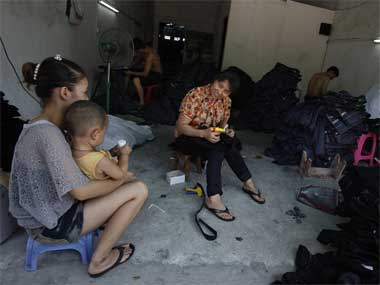By B Raman The authorities of the Chinese Ministry of Public Security, who are responsible for internal intelligence, internal security and law and order, seem to be increasingly concerned over the tendencies of sections of the population to defy the measures taken by the authorities to enforce law and order. Instances of such defiance have come since the beginning of this month from the Tibetan areas of Sichuan Province and from Guangdong Province in the east, from where the Chinese economic miracle started in the early 1980s and then spread to other parts of China. Buddhist monks in Sichuan province continue to protest in public over the illegal detention of about 300 monks of the Kirti monastery in a military detention centre to subject them to what the Chinese call “legal education” following their demonstration of their solidarity with a 16-year-old monk who committed self-immolation in March to protest against the continued Chinese rule of the Tibetan areas. The protest has since spread to other Tibetan areas. Tibetan monks and nuns in Kardze, also in Sichuan province, have stepped up protests against Chinese rule despite being beaten up and detained in military camps by the authorities. The Chinese authorities are going ahead with their plans for a major celebration in July in the Tibetan areas to mark the 90th anniversary of the founding of the Communist Party of China and the 60th anniversary of the occupation of the Tibetan areas by the People’s Liberation Army (PLA). [caption id=“attachment_26183” align=“alignleft” width=“380” caption=“The unrest in and around Xintang township in Guangdong Province was triggered by alleged unfair treatment meted out to migrant Chinese workers from other parts of China. Daniel Wallis/Reuters”]  [/caption] In view of the continuing protest movement of the monks, the Chinese authorities apprehend that attempts could be made to disrupt the special events planned to be held in July to mark the two anniversaries. They have, therefore, stopped issuing visas to foreign nationals for visiting Tibet till the end of July. However, there will be no restrictions on the visit of Chinese nationals to Tibet for domestic tourism. The unrest in Xintang The unrest in and around Xintang township in Guangdong Province was triggered by alleged unfair treatment meted out to migrant Chinese workers from other parts of China, who have been allowed to work in the manufacturing industries of the province. Through strict control of the Internet, the Chinese authorities have sought to prevent details of the protest movement of the monks from reaching the outside world. However, they have not been able to prevent the details of the unrest of the migrant workers of Guangdong Province from spreading to other parts of China and the outside world. Protesting migrant workers are managing to send out messages through Chinese blogging sites. However, the use of blogging sites to spread protest messages has not been as extensive as during the Jasmine Revolution earlier this year in Tunisia and Egypt. One message thus sent out through a Chinese blogging site reads: “As far as the police and army are concerned, they may crush the current rioting, but the fundamental problems will not have been addressed. As China’s income gap has grown, many people are forced to live in remote cities year-round to make ends meet as migrant workers. But they suffer discrimination and maltreatment from everyone around them: their bosses, landlords, and even local residents. They are treated as second- or third-class citizens. The ‘iron fist’ policy is not the way to deal with them. You can quell the riot in Xintang, but it will just happen somewhere else.” Xintang, about 40 km east of Guangzhou (the capital of Guangdong Province), is the epicentre of the protest movement of the migrant workers, which started spontaneously on June 10. Security troops of the Ministry of Public Security, backed by armoured vehicles, fired teargas shells at thousands of rioters on the streets of Xintang township in Zengcheng prefecture. The images of the firing of teargas shells have appeared on many blogging sites. The incident that triggered the riot is reminiscent of what happened in Tunisia. The Xintang protest movement was triggered off by a dispute between security guards and a migrant couple, including a pregnant woman, who had set up a stall at the entrance to a supermarket. When the security guards tried to confiscate the couple’s earnings, claiming that they were running the stall without permission, a tussle ensued and the security guards allegedly pushed the pregnant woman to the ground. The security guards then arrested the couple, but other migrant workers prevented them from taking the couple to the police station. The riots then started and they have been continuing off and on since then despite the arrival of security reinforcements. The migrant workers are demanding the arrest and prosecution of the security guards who pushed the pregnant woman to the ground. B Raman is Additional Secretary (Retired), Cabinet Secretariat, Government of India; he is currently Director, Institute For Topical Studies, Chennai, and Associate of the Chennai Centre for China Studies. Republished with permission from the Chennai Centre for China Studies.
Riots in a southern Chinese town, and protests by Tibetan Buddhist monks, point to the pushback against Chinese authorities’ hardline methods to impose order.
Advertisement
End of Article
Written by FP Archives
see more


)

)
)
)
)
)
)
)
)



